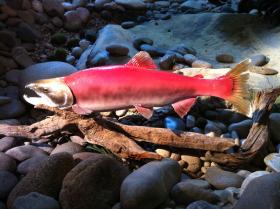forum
library
tutorial
contact

Dams Proposal Looms
Over Governors' Group
by Eric Barker
Lewiston Tribune, February 23, 2021
|
the film forum library tutorial contact |

|
Dams Proposal Looms
by Eric Barker
|
Columbia Basin Collaborative, just in process of getting organized,
discusses how it might address breaching proposal
 Organizers of the nascent Columbia Basin Collaborative were urged to not let the typically slow pace of such proceedings prevent the body from considering a dam breaching proposal that could require quick action.
Organizers of the nascent Columbia Basin Collaborative were urged to not let the typically slow pace of such proceedings prevent the body from considering a dam breaching proposal that could require quick action.
The group is being formed by the governors of Idaho, Washington, Oregon and Montana to take a top-level view of salmon and steelhead recovery efforts in the vast region and recommend ways to improve that work. According to an organizational outline unveiled Wednesday, the collaborative body would include leaders of the four Columbia River treaty tribes and participation from a wide range of stakeholders.
Representatives of the four governors are still discussing things like its purported vision, principles and scope, how it will be organized and how it will function. But Rep. Mike Simpson's $33 billion proposal to breach the four lower Snake River dams and mitigate affected communities and industries while reordering fish, power and transportation systems in the region loomed over the group's organizational workshop Wednesday. Simpson has said his concept could be included in a broad infrastructure package that is expected to by pursued by President Joe Biden's administration late this year, making the time to shape the breaching proposal short.
During a comment period of the organizational meeting held via Zoom, Dave Johnson, director of the Nez Perce Tribe's Department of Fisheries Resources, pushed for the group to take up the proposal as one of its main concerns.
"It is a unique proposal at a unique legislative and political moment, and I can't emphasize that enough," he said. "The tribe believes there is no mutual task that could come out of this meeting today that would be more important than all of us agreeing to carefully consider the Simpson proposal in its every detail and element and opportunity, really take that careful look at it and ask ourselves whether it isn't in fact exactly what the Northwest needs at this moment in time."
Jeremy Wolf, vice chairman of the Confederated Tribes of the Umatilla Reservation, also said the proposal should be taken up, as did several commenters who represented various stakeholder groups. Richard Scully, of Lewiston, who served on Idaho Gov. Brad Little's Salmon Workgroup, said collaboratives and their drive for consensus decision making can lead to watered-down recommendations.
"I'm really pleased to see Rep. Simpson's draft on the table," he said. "At least it's something that provides something for everybody in a way that possibly consensus can be reached because there won't be anybody left behind."
Following the meeting, the Idaho Conservation League issued a statement asking that the process strive to consider and discuss Simpson's proposal even as members of the collaborative settle in for a longer-term look at salmon recovery.
"In-depth discussions, like those likely to emerge from the collaborative, will be more successful once significant investment for infrastructure and jobs for the region is secured. To succeed on behalf of salmon, energy, and communities, the Congressional effort and the (collaborative) should work to move forward simultaneously and expeditiously," the statement read.
Representatives of the governors acknowledged Simpson's proposal and referenced it specifically when outlying their desire for the collaborative to be nimble and opportunistic -- one of the proposed guiding principles of the collaborative.
"We are not yet chartered, and yet here is something we can be nimble and opportunistic with," said Jim McKenna, representing Oregon Gov. Kate Brown. "We could look at that. We could maybe identify an ad hoc group that could keep tabs on any new ideas or concepts or funding opportunities that come to the table."
Guy Norman, representing Washington Gov. Jay Inslee, suggested the collaborative could play a role in Simpson's plan if it were to be translated into legislation and approved by Congress.
"We could see this collaborative with the understanding, with the expertise associated with this collaborative, that there could be a role for oversight and implementation," he said.
More information about the collaborative including a video recording of the meeting is available at species.idaho.gov/columbia-basin-collaborative/.
learn more on topics covered in the film
see the video
read the script
learn the songs
discussion forum
